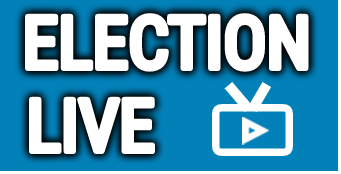Al Jazeera
A barbershop debate
Published
3 months agoon
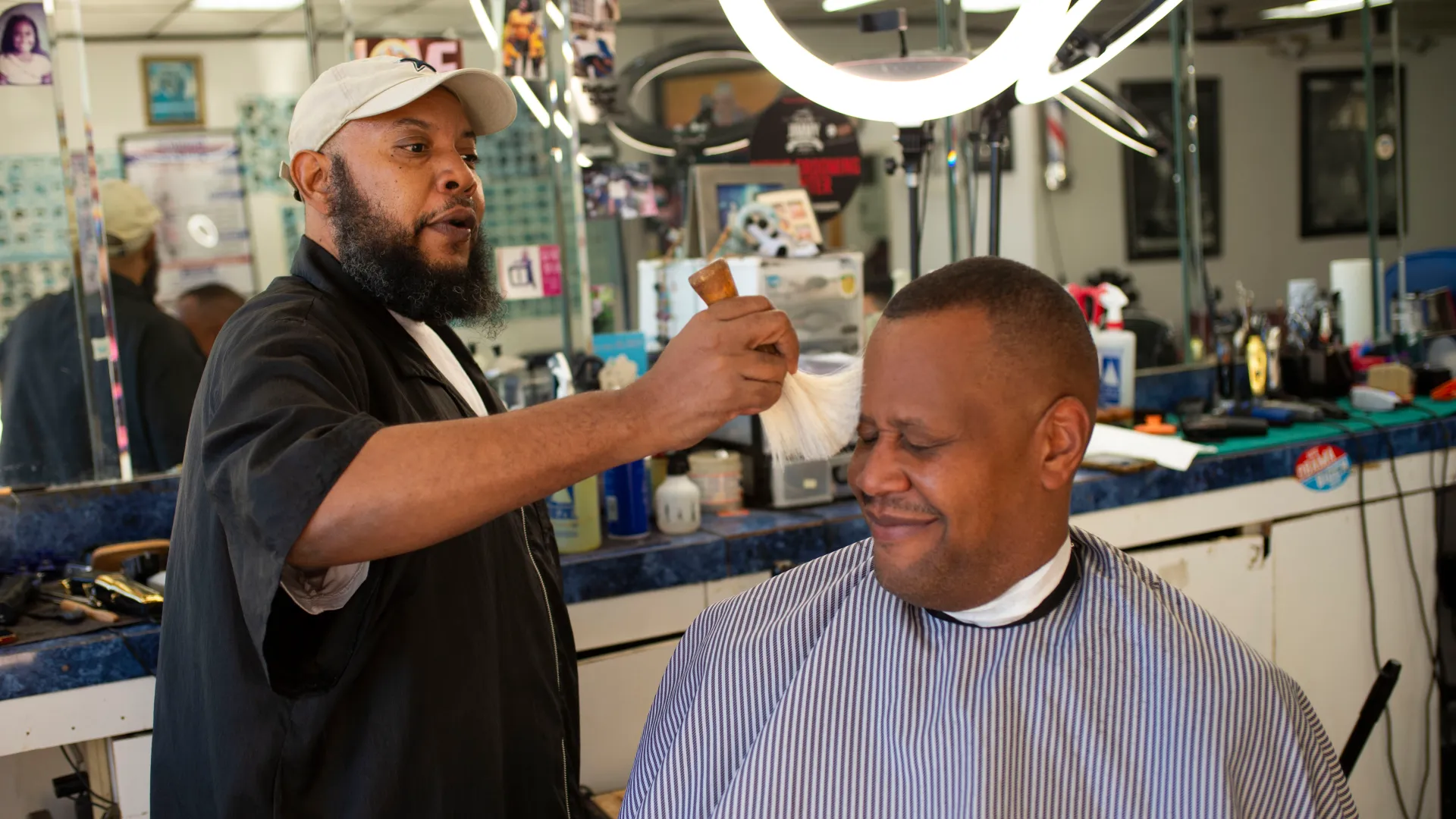

Published On 29 Oct 202429 Oct 2024
Atlanta, Georgia – At a barbershop in the suburbs of Georgia’s capital, a debate has sparked over a trim.
Fifty-four-year-old owner Goody does not believe Republican presidential candidate Donald Trump can make meaningful inroads with Black voters like himself, in the final stretch before the United States’ presidential election on November 5, despite what recent polls may show.
His regular customer, 53-year-old Gardy Leandre, a private tax director who moved to the US from Haiti while in high school, disagrees.
“I’m telling you as a taxman, I know he did great things by bringing the economy back,” he said of Trump’s time in office, which ended after he lost to President Joe Biden in 2020.
Goody pushed back, reminding his old customer of the many controversies surrounding Trump, both during his presidency and since.
What about Trump’s comments on Haitian immigrants, falsely suggesting they eat pets? Leandre tells him Haiti would be better off under Trump, and that he wouldn’t actually get rid of immigrants who work.
What about Trump’s response to the disastrous Hurricane Maria that hit Puerto Rico in 2017, when he threw paper towels at a crowd of people in need? Leandre pivots and talks about support for small business owners.
What about the January 6, 2021 riot at the US Capitol, when Trump supporters overran the building as politicians inside ratified Biden’s win?
“I’m not going to give him a pass on that,” Leandre told Al Jazeera. “But at the end of the day, if I want my 401(k) [retirement savings] to go up, if I want to put food on my table for my kids, I gotta go for Trump.”
Goody grows exasperated. What about Trump’s response to the COVID-19 pandemic? What about the Muslim ban?
“I understand all the nastiness about Trump, trust me,” Leandre finally said. “But there’s an election Trump, and there’s President Trump.”
Holding clippers to Leandre’s head, Goody was incredulous.
“Man, you were in New York for the Central Park Five,” he told Leandre, referring to Trump’s racist campaign against a group of young Black and Hispanic men wrongfully convicted of a brutal New York City rape in 1989.
“Trump was bred off racism.”
The conversation, under an LED halo light and across from a faded poster of the country’s first Black president, Barack Obama, circled questions that could determine which way Georgia goes in the upcoming presidential election. The answers could, in turn, make the difference in who enters the White House.
Will Georgia see the record level of Black and minority engagement that was a cornerstone of the coalition that delivered the key battleground state to Democrats in 2020, for the first time in 18 years?
And if that engagement does reach or exceed those levels, will Black voters’ new electoral muscle in the state still be used to achieve a victory for Democrat Kamala Harris?
Georgia’s already significant Black population exploded between 2000 and 2020, with Black residents making up about 48 percent of the state’s growth in eligible voters – 920,000 new Black voters to be precise – during that period, according to the Pew Research Center. As of 2022, Georgia had 2.6 million eligible Black voters.
The growth of the demographic has radically altered politics in what had previously been a reliably Republican state.
In 2018, Democrat Stacey Abrams almost won the governorship, fuelled by the minority voter engagement organisation she founded, the New Georgia Project.
The success of those efforts was seen in 2020. Black voter turnout in the metro Atlanta area – which accounts for 60 percent of Georgia’s overall electorate – increased by 32 percent compared to 2016.
More than half of the 2020 ballots cast for Biden were cast by Black voters, with 89 percent of the overall Black vote in Georgia going to Biden and 11 percent going to Trump, helping to fuel a wider Democratic shift across the state, which included picking up both seats in the Senate.
But, with Biden only winning Georgia by just shy of 12,000 votes last time, Democrats face a tough job holding off the Republicans.
Down the street from Goody’s shop in the majority Black suburb of Austell, Trump supporters were gathering at a church for a campaign event headlined by Trump’s former Secretary of Housing and Urban Development Ben Carson.
Inside the red-bricked, white-steepled Embassy ATL church, its founder, Bishop B Dwayne Hardin, served as emcee for the “Believers for Trump” event, which featured GOP Chairman Michael Whatley, evangelical leader Ralph Reed, and former state representative turned Trump staffer Scott Turner.
The church serves mostly Black congregants, but the crowd attending the event were racially mixed. Among them was Alveda King, the niece of civil rights icon Martin Luther King Jr, who has become a prominent conservative figure for her anti-abortion campaign.
“In case you guys didn’t know, I am a Black man,” Hardin said at one point in the event, which otherwise focused on the typical “Make America Great Again” campaign fare that has defined Trump’s politics for nearly a decade.
“And I renounce the rebuke that I received the other day.”
Hardin was referring to former US President Barack Obama, who has been recently deployed by the Harris campaign – among an array of surrogates – to shore up Black support in the final days of the race.
Speaking directly to young Black men in Pittsburgh in early October, Obama suggested sexism was to blame for an apparent slump in Black support for Harris, particularly among Black men. That slump has been shown in recent New York Times/Siena and Pew Research Center polling.

“You’re thinking about sitting out or supporting somebody [Trump] who has a history of denigrating you,” Obama said, “because you think that’s a sign of strength, because that’s what being a man is? Putting women down?”
The Times/Siena poll released in early October found that 80 percent of Black voters nationwide support Harris. That’s an increase from the 74 percent of Black voters who supported Biden before he dropped out of the race in July.
Still, it’s a marked decrease from the 90 percent of the Black vote Biden received nationally in 2020. In turn, 15 percent of Black voters said they would vote for Trump, the poll found, a marked increase from the 9 percent he carried nationally in 2020.
Trump’s campaign – and his prominent Black surrogates – have repeatedly seized on Obama’s words as evidence Democrats have taken their key demographic for granted.
The Times/Siena poll indicated the messaging might not be so far off the mark: 45 percent of Black voters under 30 rated Republicans as more likely to follow through on campaign promises than Democrats.
Outside of the “Believers for Trump” event, Black attendees also shared a similar sentiment.
“The governance of the country over the last year has not been good,” said 80-year-old George Smith, who predicted more Black voters will be motivated by immigration and by the economy to move towards Trump.
“Everything is not always colour focused,” he said as the sun set on Austell. “That’s the problem we have today in our system … If you disagree with someone, then there’s something wrong with you.”
In the cold light of day, on a crisp morning of early voting at CT Martin Natatorium and Recreation Center in southwest Atlanta, Black voter after Black voter pointed to any number of reasons they saw another Trump presidency as unacceptable.
That included Trump’s past cosiness with far-right and white supremacist groups, his election denialism, his racially tinged attacks on adversaries, his claim that Haitian migrants were eating pets or even his ham-fisted pledge to protect “Black jobs”, to name a few.
“To me, we only had one choice, and that was Kamala,” said Carolyn Sanders, a retired telecommunications worker. “We can’t go back to the racism, the hurting people.”
Her son, 47-year-old truck driver Detoine Sanders, added: “And it was blatant. We understand that this country has racism, based on the systems it was found on, [slavery], but people were really just coming out and saying what was on their mind.”
Other voters in Atlanta, a city studies show continues to have some of the highest rates of racial and economic inequality in the country, struggled to see why Trump was being viewed as better for the economy – and working people – than Harris.
While the Biden administration, for which Harris serves as vice president, has struggled with inflation and higher prices on basic goods than those seen under Trump, both Harris and the former Republican president have laid out populist-leaning economic proposals aimed at winning the votes of working Americans.
Harris has vowed to create an “opportunity economy”, which would include a first-of-its-kind ban on price gouging, extra assistance to first-time homebuyers, child tax credits and increased taxes on corporations – with cuts for the middle class.
Most recently, she laid out an economic proposal specifically aimed at Black men – another first – that would offer special loans to Black entrepreneurs, seek to address health issues that disproportionately affect Black men, and federally legalise marijuana.
For his part, Trump has vowed to end taxes on tips, Social Security and overtime, while imposing more tariffs to force corporations to manufacture inside of the US.
Echoing President Obama, 43-year-old Carla Travis, an office manager who voted with her wife, said she believed Harris – the former top prosecutor of California – is receiving extra scrutiny as a Black woman. Travis was adamant that a Black man in Harris’s position would not see the same softening of support.
“Sexism exists, and unfortunately it’s a reality in our community,” she said, adding that both parties have struggled to speak to the complexities of the overlapping perspectives of Black identity.
Squinting in the morning sun, voter Kyle Poag, a 31-year-old truck driver, said he had little faith either candidate would make a meaningful difference in his life, but he decided to vote “to assert what little influence I can in this messed-up system”.
He declined to say who he voted for, but added: “I understand why some people might [have voted for Trump], but there are things that are more important than dollars.”
In nearby Gwinnett County, part of the swiftly diversifying sprawl of Atlanta’s wider metro region, 30-year-old Brandon Davenport said a single policy point won his vote, and would have done so regardless of the candidate’s race or gender.
“I’m always working, and I’m always trying to put in extra hours of overtime,” said Davenport, who works in a tire shop. “I’m not saying that everything he said is dead on the money, but [Trump] got me on the overtime tax cut.”
Back in southwest Atlanta, under the stained-glass crucifix at Flipper Temple AME Church, activists took part in a simple act of defiance.
Standing four by four in parallel lines in front of the early voting site, organisers passed plastic bottles of water to voters. The act was bookended by a prayer and gospel tune.
Through the small gesture of handing out water, the group intentionally violated SB202, a sweeping election law passed by Republicans in Georgia in the wake of the 2020 vote. It is among several bills passed across the country that voting rights advocates have said disproportionately disenfranchise minority voters.
One measure prohibits – in most circumstances – giving food or water to those waiting in line at polling sites. The longest wait times – which in the past have been up to 10 hours – are typically found in denser urban areas, where there are large minority populations that tend to skew Democratic.
“We know that laws like this that are spreading across the country are immoral, but that’s somewhat hard to see,” said Nicole Carty, a 36-year-old local organiser with the Get Free movement. “So as Dr [Martin Luther] King would say, ‘It’s important to dramatise the issue’.”
Pointing to Georgia’s storied role in the US civil rights movement, Gerald Griggs, the president of Georgia’s NAACP, said he believes any measures that could limit Black voters will be met, instead, by increased Black engagement.
Beyond SB202, other recent measures have removed ballot drop-off boxes from some areas and attempts to require more proof of identification for some voters – also seen as disproportionately affecting minorities.
“The easiest way to get Black people to become less disillusioned is to show that they are trying to take away that most precious right,” Griggs said.
He was confident that Black churches and groups like the Georgia Voting Project and Black Voters Matter – along with the Divine Nine, a collection of elite Black college fraternities and sororities – had developed “surgical” voter registration and get-out-the-vote operations that could win any election for any candidate able to enthuse minority voters.
But he was also aware that modern wins for federal legislation that would directly address issues faced by Black residents of the US remain rare. The George Floyd Justice in Policing Act and the John Lewis Voting Rights Advancement Act of 2021 have languished amid congressional opposition, while Biden’s signature student loan forgiveness programme was largely neutered by the courts.
The federal gridlock can translate to disillusionment on the ground. Despite the recent increases in Black voters – who already turned out at higher rates than white voters – hundreds of thousands of possible Black voters remain untapped, he said.
“I think Black people recognise their power in Georgia and are exercising it in a way that’s sending a message to the rest of the country,” he told Al Jazeera.
“But we need concrete legislation,” he said. “The problem is the couch is still running a strong race.”
Both presidential campaigns – and groups working on their behalf – have launched special Black outreach efforts in the final days of the race. Both candidates have recently visited Atlanta, and have touted smaller “listening sessions” with Black men at bars and barbershops across the state.
But Jacqueline Lamar, a home health aide from the metro Atlanta city of Covington, also said she has been struck by high levels of disillusionment as she advocates for Harris in the final days of the race.
“I was doing phone banking the other day, and it saddened me that so many Black and brown people were telling me on the phone that they don’t want to vote,” she told Al Jazeera. “They just see it as two people yelling and they don’t want to be a part of it.”
Lamar had worked for an agency making just $9 an hour before she herself suffered a stroke and required care. Unable to afford her own home health worker, she saw the burden fall on her daughters.
She has been particularly motivated by Harris’s proposal to expand Medicare to cover home healthcare – an industry that is dominated by Black and minority women. She hopes her personal story can connect with those considering sitting out the election.
“Anybody can talk slick, and tell you some good stuff and get your attention,” Lamar, who organises with the Care in Action group, told Al Jazeera. “But people need to see it means something.”

Black population growth in Georgia has been largely fuelled by what has been described as a “reverse northern migration”, a reference to the mass exodus of Black residents facing racist policies in the US South throughout the 20th century.
Many have returned to the Atlanta area, both for its cultural significance and the growing technology, transportation and film industries.
The growth has been buoyed – to a smaller extent – by new immigrants. In combination, the rapid increase in Georgia’s Black, Hispanic and Asian population has put Georgia on track to soon become a minority-majority state. Some argue it has already reached that point.
In the northwestern cities near Atlanta, another organisation is trying to turn out an often overlooked demographic that spans several minority groups: Muslim voters, a large proportion of whom are Black.
“A lot of the activism is usually framed through the Christian lens. But there has been a history of Muslim activism in Atlanta and in America, going back to Malcolm X and other civil rights leaders,” said Xan-Rhea Bilal, a 29-year-old senior organiser with the Georgia Muslim Voter Project.
“Civic engagement and voting is one of the tools in our toolbox that we can use to achieve the things that we need,” said Bilal, whose parents are originally from Trinidad, her mother a Christian, her father a Muslim.
She added that there are an estimated 200,000 Muslims in Georgia, with 90,000 registered to vote.
“The margin of the presidential election for 2020 was less than 12,000 votes, right? So just with that map alone, you can see that we do have the power to impact the margins.”
On an afternoon in late October, three members of the organisation made their way through an overgrown and crumbling apartment complex in Clarkston, often considered one of the most diverse cities in the country.
They urged the mostly Somali American residents they encountered to attend a listening session with local candidates and handed out voting information. The group is non-partisan, and does not endorse candidates.
Warsammeh Bured, a 54-year-old immigrant from Somalia, said he has felt left behind by all levels of government as his living environment has deteriorated around him.
“We came out from a war in Africa … but you see the situation we are in here. We were not expecting to live life like this in America.”
“It’s the housing crisis in America. The cost of living is going up, the cost of gas [petrol], everything is going up, but the paycheque is not increasing,” he said, estimating he would need to spend his entire monthly salary from working at a warehouse on rent if he were to move.
“We need a change. Trump is a businessman, he only cares about businessmen. We need someone who cares about the normal community – low-income people,” he said.
“It’s time to choose the president of the United States to be a woman.”
SOURCE: AL JAZEERA
You may like
-


Fact check: Walz v Vance vice presidential debate – truths and falsehoods
-


Vice presidential debate between JD Vance, Tim Walz draws 43M viewers
-
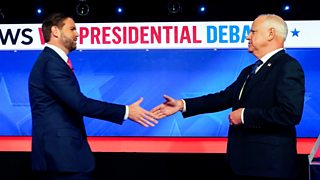

Muted mics and politeness – six takeaways from VP debate
-


Vance and Walz keep it civil in a policy-heavy discussion: VP debate takeaways
-


Walz and Vance go in depth on policy while attacking each other’s running mates in VP debate
-


FACT FOCUS: A look at false and misleading claims during the vice presidential debate
-


Does Trump really want his VP to have the final debate word this election?
-
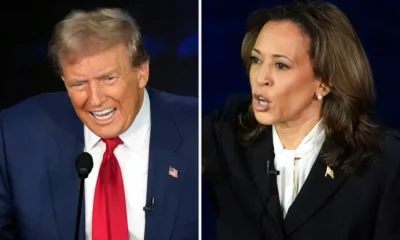

Harris challenges Trump to second US presidential debate
-


Days of preparation and one final warning. How Kamala Harris got ready for her big debate moment
-


Will Donald Trump and Kamala Harris Debate Again? Here’s What We Know
Al Jazeera
US election live: Latest polls show Harris, Trump tied on election eve
Published
3 months agoon
November 5, 2024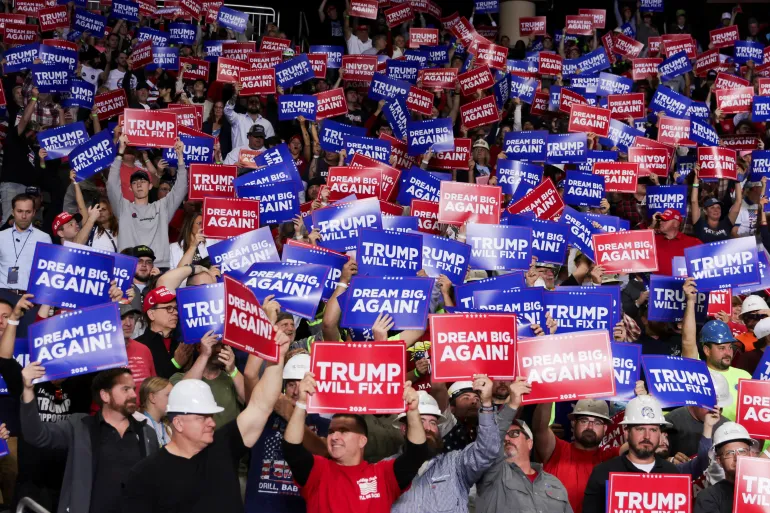

Video Duration 02 minutes 56 seconds02:56
Published On 5 Nov 20245 Nov 2024
Click here to share on social media
- After a heated presidential campaign, millions of voters across the United States are gearing up to cast their ballots on Election Day.
- Democratic candidate Kamala Harris and Republican Donald Trump are going head-to-head in a race that remains too close to call.
- What time do polls close in your state on Election Day in the US?Millions of Americans are set to cast their ballots after a heated presidential election campaign.Tuesday is the final day to cast a ballot, and below, we’ve assembled a broad overview of when polling stations close in each of the 50 states, which span six time zones. Check it out here.Click here to share on social media
- 20m ago (09:20 GMT)‘I Voted’ stickers are running their own contestIn Georgia, it’s adorned with a peach. In the seaside city of San Francisco, it boasts sea lions and the Golden Gate Bridge.The “I Voted” sticker is the traditional prize of casting a ballot on Election Day – and different jurisdictions around the US use their versions to show off their local pride.Some areas even encourage submissions from residents. A fan favourite this year came from Grosse Pointe Farms, Michigan, where 12-year-old Jane Hynous submitted a drawing to a local “I Voted” sticker competition – and came away victorious.Her entry? A deranged werewolf, ripping its shirt in two: a perfect portrait of the pathos of election season.
 A volunteer helps cut “I Voted” stickers at the Boyle Heights Senior Center on Monday, in Los Angeles [Damian Dovarganes/AP Photo]Click here to share on social media
A volunteer helps cut “I Voted” stickers at the Boyle Heights Senior Center on Monday, in Los Angeles [Damian Dovarganes/AP Photo]Click here to share on social media - 30m ago (09:10 GMT)
Key economic data that landed in the final days of the raceThe monthly jobs report, released by the Bureau of Labor Statistics on Friday, showed that the economy added about 12,000 jobs in October. In September, by comparison, the economy added about 223,000 jobs.For Harris, who is rated as less competent than Trump to handle the economy in most polls, the report could have hardly arrived at a worse time. Unsurprisingly, the Trump campaign held up the report as evidence of economic mismanagement by the Biden-Harris administration, branding the jobs figure a “catastrophe”.The picture, however, is complicated by the fact that the period overlapped with hurricanes Helene and Milton and strike action by more than 30,000 Boeing employees.Even so, the figure fell well short of expectations: economists polled by Dow Jones, who took into account the hurricanes and the strike, had predicted 100,000 jobs. Still, there are other strong economic metrics to consider, too, including 2.8 percent growth in the third quarter.Click here to share on social media
- 40m ago (09:00 GMT)Harris’s Indian ancestral village is praying for her victoryResidents of the tiny South Indian village of Thulasendrapuram in Tamil Nadu have gathered to pray for Harris, who could become the first United States leader with South Asian roots.Harris’s maternal grandfather was born in the village, about 350 kilometres (217 miles) from the southern coastal city of Chennai, more than 100 years ago. As an adult, he moved to Chennai, where he worked as a high-ranking government official until his retirement.Harris has never visited Thulasendrapuram and she has no living relatives in the village, but people here still venerate the family that made it big in the US.“Our village ancestors’ granddaughter is running as a US presidential candidate. Her victory will be happy news for every one of us,” M Natarajan, the temple priest, told The Associated Press.Natarajan led prayers in front of the image of the Hindu deity Ayyanar, a form of Lord Shiva. “Our deity is a very powerful God. If we pray well to him, he will make her victorious,” he said.
 Villagers participate in special prayers for the victory of the Democratic presidential nominee in Thulasendrapuram, an ancestral village of Harris, in Tamil Nadu state, India [Aijaz Rahi/AP]Click here to share on social media
Villagers participate in special prayers for the victory of the Democratic presidential nominee in Thulasendrapuram, an ancestral village of Harris, in Tamil Nadu state, India [Aijaz Rahi/AP]Click here to share on social media - 50m ago (08:50 GMT)Texas, Missouri judges deny requests to block Justice Department from sending poll monitorsUS judges have denied requests from the Republican-led states of Missouri and Texas to block the federal government from sending lawyers to their states on Election Day to monitor compliance with federal voting rights laws.Both states are among the 27 that the US Justice Department said it would send monitoring staff to at voting locations, as it has done regularly during national elections.Texas Attorney General Ken Paxton had said sending monitors “infringes on States’ constitutional authority to run free and fair elections”.Trump continues to falsely claim that his 2020 defeat was the result of widespread fraud. He has urged his supporters to turn out at polling locations to watch for suspected fraud.Click here to share on social media
- 1h ago (08:40 GMT)It’s voting day. Here’s what polls say, what Harris and Trump are up toAccording to FiveThirtyEight’s daily tracker, Harris has a 1.2-point lead over Trump nationally, a margin that has remained fairly static in recent days, though it has shrunk compared with a month ago.In swing states, Harris has a one-point advantage in Michigan and Wisconsin, according to the same tracker.Harris spent the final day campaigning in Pennsylvania. The Democratic candidate started with an event in Scranton, the hometown of President Joe Biden.Trump continued his campaign with a whirlwind tour through North Carolina, Pennsylvania and Michigan.In his first stop at Raleigh, North Carolina, the Republican candidate claimed a decisive advantage in the presidential race. He then went to Reading, Pennsylvania, where he again suggested that he would carry out mass deportations of immigrants.Read our full story here.Click here to share on social media
- 1h ago (08:30 GMT)US presidential candidates end their final campaign rallies
 Democratic presidential nominee Vice President Kamala Harris speaks during a campaign rally in Philadelphia, Pennsylvania, on Monday [Evelyn Hockstein/Reuters]
Democratic presidential nominee Vice President Kamala Harris speaks during a campaign rally in Philadelphia, Pennsylvania, on Monday [Evelyn Hockstein/Reuters] Supporters of Democratic presidential nominee Vice President Kamala Harris attend a campaign rally in Philadelphia [Evelyn Hockstein/Reuters]
Supporters of Democratic presidential nominee Vice President Kamala Harris attend a campaign rally in Philadelphia [Evelyn Hockstein/Reuters] Republican presidential nominee and former President Donald Trump reacts during his campaign rally at Van Andel Arena in Grand Rapids, Michigan, on Tuesday [Brian Snyder/Reuters]
Republican presidential nominee and former President Donald Trump reacts during his campaign rally at Van Andel Arena in Grand Rapids, Michigan, on Tuesday [Brian Snyder/Reuters] Republican presidential nominee and former President Donald Trump dances at a campaign rally in Grand Rapids [Carlos Osorio/Reuters]Click here to share on social media
Republican presidential nominee and former President Donald Trump dances at a campaign rally in Grand Rapids [Carlos Osorio/Reuters]Click here to share on social media - 1h ago (08:25 GMT)What did Harris say in her closing argument in Pennsylvania?Harris ended her campaign in Philadelphia, at the art museum steps made famous in the movie Rocky, and was introduced by Oprah Winfrey and Lady Gaga.“The momentum is on our side,” she said, focusing on optimism about the future and never mentioning Trump by name.She doubled down on the economy, a key issue for US voters grappling with unemployment and inflation, and outlined her plan to “build an economy where we bring down the cost of living”.Among the measures she intends to implement, she listed a ban on corporate price gouging on groceries; cutting taxes for workers, middle-class families and small businesses; and lowering healthcare costs, including the cost of home care for seniors.
 Oprah Winfrey introduces US Vice President Kamala Harris in Philadelphia, Pennsylvania, on the eve of Election Day [Angela Weiss/ AFP]Click here to share on social media
Oprah Winfrey introduces US Vice President Kamala Harris in Philadelphia, Pennsylvania, on the eve of Election Day [Angela Weiss/ AFP]Click here to share on social media - Sign up for Al JazeeraAmericas Coverage NewsletterUS politics, Canada’s multiculturalism, South America’s geopolitical rise—we bring you the stories that matter.Subscribe
By signing up, you agree to our Privacy Policyprotected by reCAPTCHA
- 1h ago (08:24 GMT)A recap of the latest developmentsLet’s bring you up to speed:
- Democratic candidate Kamala Harris and Republican Donald Trump have made their final appeals to American voters ahead of Election Day on Tuesday.
- Harris has stressed she intends to be a “president for all” at her closing campaign rally in Philadelphia, Pennsylvania while Trump pledges to lead the US to “new heights of glory” at an event in Grand Rapids, Michigan.
- Polls continue to show the candidates locked in a close battle for the White House, with the race likely to come down to key swing states.
- More than 82 million Americans have voted ahead of Election Day, according to a tally by the University of Florida’s Election Lab.
- 1h ago (08:24 GMT)Photos: Harris and Trump deliver final pleas to US voters
 Harris speaks during a rally in Pennsylvania, November 4 [Susan Walsh/AP Photo]
Harris speaks during a rally in Pennsylvania, November 4 [Susan Walsh/AP Photo] Trump dances at an event in Pennsylvania, November 4 [Chris Szagola/AP Photo]
Trump dances at an event in Pennsylvania, November 4 [Chris Szagola/AP Photo] [Jeenah Moon/Reuters]
[Jeenah Moon/Reuters] Harris supporters ahead of her speech in Philadelphia [Hannah McKay/Reuters]Click here to share on social media
Harris supporters ahead of her speech in Philadelphia [Hannah McKay/Reuters]Click here to share on social media - 1h ago (08:24 GMT)Where do Harris, Trump stand on key issues?Harris and Trump have spent months pitching their different visions for the country.The presidential candidates advocated to solve the country’s problems, diverging on most of the policies and only agreeing on some.From the economy to foreign policy, immigration, abortion and crime, we’ve taken a closer look at their campaign platforms and promises.Have a look at their positions on the key issues in our story, here.
 https://imasdk.googleapis.com/js/core/bridge3.675.2_en.html#goog_1829997514Play VideoVideo Duration 27 minutes 00 seconds27:00How will domestic issues shape the US election?Click here to share on social media
https://imasdk.googleapis.com/js/core/bridge3.675.2_en.html#goog_1829997514Play VideoVideo Duration 27 minutes 00 seconds27:00How will domestic issues shape the US election?Click here to share on social media - 1h ago (08:23 GMT)
How will US Election Day unfold?Millions of Americans will head to polling booths to cast their ballots in the US presidential election.Voters will also elect 34 US senators (out of 100) and all 435 members for the US House of Representatives, among other posts that are up for grabs.With the country stretching across six time zones, Election Day is a massive undertaking – and voting will begin as early as 5am EST (10:00 GMT) and go as late as 1am (06:00 GMT) on Wednesday.Check out our hour-by-hour breakdown of how Election Day will unfold, in our explainer, here.Click here to share on social media
- 1h ago (08:23 GMT)What did Trump say in his closing argument in Michigan?Trump showed up more than 90 minutes after he was scheduled to begin his remarks in Grand Rapids, Michigan. An old clip of Trump shaving the head of disgraced former WWE CEO and longtime associate Vince McMahon on a wrestling show was played to entertain the crowd.He started the rally by recounting his unlikely victory in 2016 and then predicted the greatest victory ‘in the history of our country’. He even claimed that God had saved him from an assassination attempt during a campaign rally in Pennsylvania in July so that he could “save America.”He again linked immigration to a high crime rate, despite data showing the opposite, blending false claims about voter fraud with warnings about migrants committing crimes and promises to revitalise the United States.“Over the past four years, Americans have suffered one catastrophic failure, betrayal and humiliation after another,” Trump said. He added that “we do not have to settle for weakness, incompetence, decline, and decay.”Click here to share on social media
- 1h ago (08:18 GMT)Welcome to our live coverageIt’s officially Election Day in the United States!Millions of Americans will head to the polls on November 5 to cast their ballots after a heated presidential election campaign.Democratic candidate Kamala Harris and Republican Donald Trump are locked in a close fight, with recent polls showing the race remains too close to call nationally and in key battleground states.Stay with Al Jazeera’s Live team as we bring you the latest developments, analyses and reactions from across the US.
 Former US President and Republican presidential candidate Donald Trump speaks during his final campaign rally at Van Andel Arena in Grand Rapids, Michigan in the early hours of Tuesday [Jeff Kowalsky/AFP]Click here to share on social media
Former US President and Republican presidential candidate Donald Trump speaks during his final campaign rally at Van Andel Arena in Grand Rapids, Michigan in the early hours of Tuesday [Jeff Kowalsky/AFP]Click here to share on social media
SOURCE: AL JAZEERA AND NEWS AGENCIES
Al Jazeera
Elon Musk’s $1m US voter giveaway to continue, Pennsylvania judge rules
Published
3 months agoon
November 5, 2024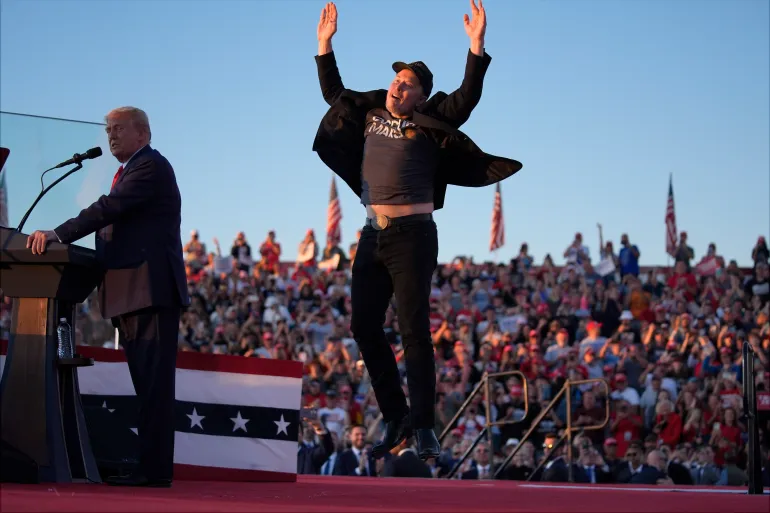
The state’s top Democratic legal official says the giveaway in states likely to decide the US election is a ‘scam’.
Published On 5 Nov 20245 Nov 2024
A $1m-a-day voter sweepstakes operated by a political group established by billionaire Elon Musk can continue, a judge in the state of Pennsylvania has ruled.
Last month, the world’s richest man announced he would start the giveaway in seven battleground states likely to decide the outcome of the United States 2024 election.
Musk’s giveaway has widely been seen by many as an unsubtle attempt to secure extra votes for Republican candidate Donald Trump, who Musk has thrown his vocal and financial support behind.
Musk has given $75m to America PAC, a political action committee that has been funding various Republican candidates, including former President Trump.
Winners ‘not chosen by chance’
The Tesla CEO has already gifted $16m to registered swing-state voters who qualified for the giveaway by signing his political petition.
Advertisement
Pennsylvania‘s Common Pleas Court Judge Angelo Foglietta’s decision on Monday came after a surprising day of testimony in a state court in which Musk’s aides acknowledged hand-picking the winners of the contest based on who would be the best spokespeople for his super PAC’s agenda.
Previously, the 53-year-old billionaire had claimed the winners would be chosen at random.
District Attorney Larry Krasner, a Democrat, called the process a scam “designed to actually influence a national election” and asked that it be shut down.
As it was, the judge ruled in favour of Musk and his America PAC.
Musk’s lawyer, Chris Gober, said the final two recipients before the presidential election would be announced in Arizona on Monday and Michigan on Tuesday.
Advertisement
“The $1 million recipients are not chosen by chance,” said Gober.
“We know exactly who will be announced as the $1 million recipient today and tomorrow.”
‘They were scammed’
Chris Young, the director and treasurer of America PAC, testified that the recipients were vetted ahead of time, to “feel out their personality, [and] make sure they were someone whose values aligned” with the group.
Musk’s lawyers, defending the effort, called it “core political speech” given that participants were asked to sign a petition endorsing the US Constitution.
More than 1 million people from the seven battleground states – Pennsylvania, Wisconsin, Nevada, Arizona, Georgia, North Carolina and Michigan – have registered for the sweepstakes by signing a petition saying they support the right to free speech and to bear arms, the first two amendments to the US Constitution.
Advertisement
District Attorney Krasner has questioned how the PAC might use their data, which it will have on hand well past the election.
“They were scammed for their information,” Krasner said. “It has almost unlimited use.”
SOURCE: AL JAZEERA AND NEWS AGENCIES
Al Jazeera
Trump or Harris? Gaza war drives many Arab and Muslim voters to Jill Stein
Published
3 months agoon
November 5, 2024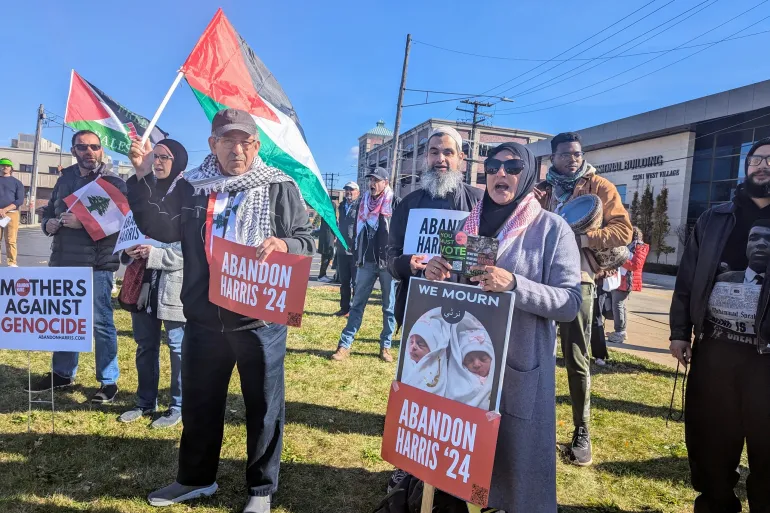
Support for Green Party candidate grows as some voters stress the need to break away from Democrats and Republicans.
By Ali Harb
Published On 4 Nov 20244 Nov 2024
Save articles to read later and create your own reading list.
Dearborn, Michigan – On a sunny but frigid afternoon, dozens of protesters stood on a street corner in the Detroit suburb of Dearborn and chanted against Democratic presidential candidate Kamala Harris as well as her Republican rival Donald Trump.
“Trump and Harris, you can’t hide, no votes for genocide,” a keffiyeh-clad young woman chanted on a bullhorn. The small but spirited crowd echoed her words.
If not Trump or Harris for the next United States president, then who?
The Abandon Harris campaign that organised the protest has endorsed Green Party candidate Jill Stein, demonstrating the growing disconnect that many Arabs and Muslims feel with both major parties over their support for Israel.
Stein has been gaining popularity in Arab and Muslim communities amid Israel’s brutal war on Gaza and Lebanon, public opinion polls show.
While the Green Party candidate is extremely unlikely to win the presidency, her supporters view voting for her as a principled choice that can set a foundation for greater viability for third-party candidates in the future.
Hassan Abdel Salam, a co-founder of the Abandon Harris campaign, said more and more voters are adopting the group’s position of ditching the two major candidates and backing Stein.
“She best exemplifies our position against genocide,” Abdel Salam said of the Green Party candidate, who has been vocal in supporting Palestinian rights.
The strategy
Abandon Harris has been urging voters against supporting the vice president over her pledge to continue arming Israel amid the US ally’s offensives in Gaza and Lebanon, which have killed more than 46,000 people.
Abdel Salam praised Stein as courageous and willing to take on both major parties despite recent attacks, especially by Democrats.
Advertisement
For the Abandon Harris campaign, backing Stein is not only about principles; it is part of a broader strategy.
“Our goal is to punish the vice president because of the genocide, to then take the blame for her defeat to send a signal to the political landscape that you should never have ignored us,” Abdel Salam told Al Jazeera.
In addition to the endorsement of the Abandon Harris campaign, Stein has won the backing of the American Arab and Muslim Political Action Committee (AMPAC), a Dearborn-based political group.
“After extensive dialogue with both the Harris and Trump campaigns, we found no commitment to addressing the urgent concerns of our community, particularly the ongoing humanitarian crisis in Gaza, the West Bank, and Lebanon,” the group said in a statement last month.
“The need for a ceasefire remains paramount for Muslim and Arab American voters, yet neither campaign has offered a viable solution.”
Advertisement
AMPAC added that it is backing Stein “based on her steadfast commitment to peace, justice, and a call for immediate ceasefires in conflict zones”.
With support for Stein on the rise in Michigan’s Arab and Muslim communities, where President Joe Biden won overwhelmingly in 2020, Democrats are noticing and pushing back.
Democrats target Stein
The Harris campaign released an advertisement aimed at Arab Americans in southeast Michigan that took a dig at third-party candidates.
In the commercial, Deputy Wayne County Executive Assad Turfe says Harris would help end the war in the Middle East as the camera zooms in on a cedar tree – Lebanon’s national symbol – hanging from his necklace.
Turfe warns voters in the video that Trump would bring more chaos and suffering if elected. “We also know a vote for a third party is a vote for Trump,” he says.
Stein’s supporters, however, categorically reject that argument.
Advertisement
Palestinian comedian and activist Amer Zahr, who is running for a school board seat in Dearborn, argued that Democrats should be grateful that Stein is on the ballot and slammed the argument that a vote for Stein is a vote for Trump as “paternalistic”.
“It assumes that if Stein wasn’t there, we’d be out there voting for you,” Zahr told Al Jazeera.
“If it really were two parties and there were no other parties, I think most of the Arab Americans who are voting for Stein would vote for neither. And in fact, if there were really only two choices, a lot of the people who are voting for Stein right now out of anger for the Democratic Party might go for Trump.”
Zahr, who was on a shortlist of candidates that Stein considered for her vice presidential pick, also dismissed the argument that a vote for the Green Party would be “wasted” because it is unlikely to win.
“I mean news flash: Voters vote for people who speak to their issues,” he told Al Jazeera, praising Stein for standing up to Israel and running as an “openly anti-genocide” candidate.
Advertisement
“Jill Stein, to me, is a noble vehicle to express our deep anger and the distrust and betrayal that we feel at the ballot box.”

https://imasdk.googleapis.com/js/core/bridge3.675.2_en.html#goog_1076291342Play Video
Video Duration 2 minutes 06 seconds2:06
The Democratic National Committee (DNC) released a separate commercial last month also proclaiming that “a vote for Stein is really a vote for Trump”.
Stein has pushed back against that claim, slamming the Democrats’ attacks as a “fear campaign and smear campaign”.
She told Al Jazeera’s The Take podcast last week that the Democratic Party is coming after her instead of “addressing the issues like the genocide, which has lost Kamala Harris so many voters”.
‘I am sick of the two-party system’
While foreign policy may not be a top priority for the average US voter, numerous Arab and Muslim Americans interviewed by Al Jazeera over the past week said Israel’s assault on Lebanon and Gaza is their number one issue.
Advertisement
And so, with both major-party presidential candidates voicing uncompromising support for Israel, some voters are looking to Stein to break away from the two parties and forge a new path.
“I am sick of the two-party system and their power play politics, where on both sides, they are unanimously agreeing on this bipartisan issue that they support Israel,” said Haneen Mahbuba, an Iraqi American voter.
With a keffiyeh-patterned scarf that says “Gaza” in Arabic around her neck, the bespectacled 30-year-old mother raised her voice in anger as she described the violence Israel is committing in Gaza and Lebanon with US support.
Mahbuba told Al Jazeera that she feels “empowered” by voting for Stein because she is not giving in to the “fearmongering” about the need to vote for the “lesser of two evils”. She added that it is Harris’s voters who are wasting their votes.
“They’re giving away their vote when they vote for the Democratic Party that has continuously dismissed us, disregarded us, silenced us and seen us as less important,” Mahbuba said.
‘Indistinguishable’
Stein ran for president in 2012, 2016 and 2020, but she failed to make a major impression on the elections.
Advertisement
However, Stein’s Arab and Muslim supporters say this year, the Green Party can put a dent in the results to show the power of voters who prioritise Palestinian human rights.
Wissam Charafeddine, an activist in the Detroit area, said backing Stein is the right choice both morally and strategically.
“I’m the type of voter who believes that voting should be based on values and not politics. This is the core of democracy,” he said.
Charafeddine, who has voted for Stein in the past, added that Arab Americans are fortunate to be concentrated in a swing state where their votes are amplified.
“When we vote for Dr Jill Stein, we are not only voting [for] the right, moral platform that actually is most aligned with our values, interests, desires and priorities, but also it accounts for the Palestine vote and to the anti-genocide vote,” Charafeddine told Al Jazeera.
Advertisement
Bottomline, advocates say the growing support for Stein shows that many Arab and Muslim voters have reached a tipping point with both the major parties’ support for Israel.
“Harris and Trump simply are indistinguishable to us because they passed a certain threshold that we cannot ever buy into the logic of lesser of two evils,” Abdel Salam told Al Jazeera.
“These are two genocidal parties, and we cannot put our hand with either of them.”
SOURCE: AL JAZEERA

US election live: Latest polls show Harris, Trump tied on election eve

Elon Musk’s $1m US voter giveaway to continue, Pennsylvania judge rules

Trump or Harris? Gaza war drives many Arab and Muslim voters to Jill Stein

Joe Rogan endorses Trump on eve of the election

Trump describes US as an occupied country in dark closing message focused on immigration
Trending
-

 The Washington Post4 months ago
The Washington Post4 months agoAre you still registered to vote? How to make sure you’re up to date.
-
Debates4 months ago
Donald Trump Vs Kamala Harris LIVE | The Big 2024 Debate | U.S. Election Latest
-
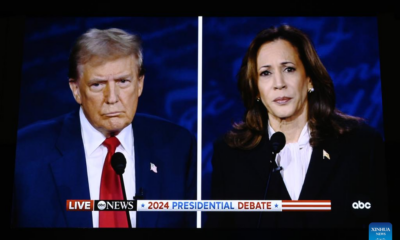
 Donald Trump4 months ago
Donald Trump4 months agoWas Harris’s debate performance enough to win over undecided voters?
-
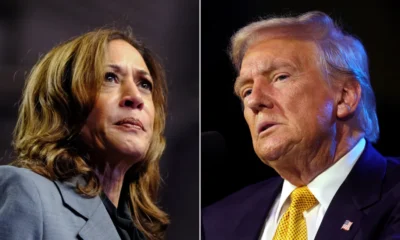
 CNN4 months ago
CNN4 months agoCNN Poll: Harris and Trump are tied in North Carolina, while vice president leads in Nebraska’s 2nd District
-
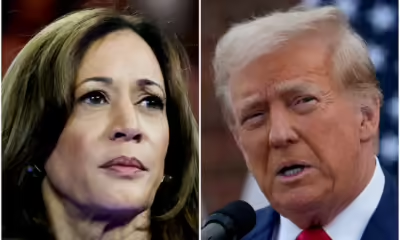
 BBC4 months ago
BBC4 months agoChina is part of the US election – but only from one candidate
-
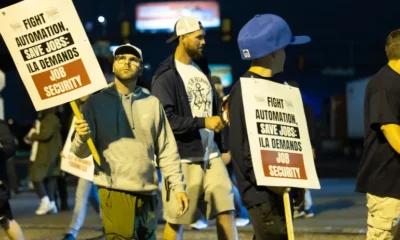
 Al Jazeera4 months ago
Al Jazeera4 months agoCould US port strike be the ‘October surprise’ that trips up Kamala Harris?
-
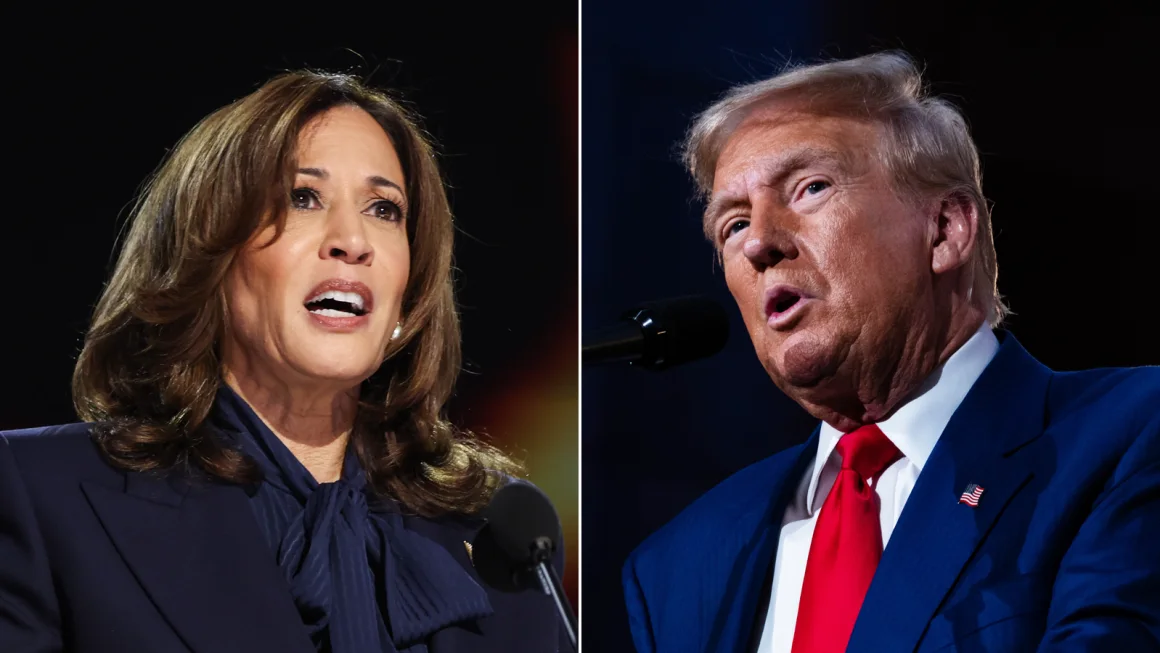
 CNN4 months ago
CNN4 months agoHarris braces for the most critical moment of her political career at debate with Trump
-
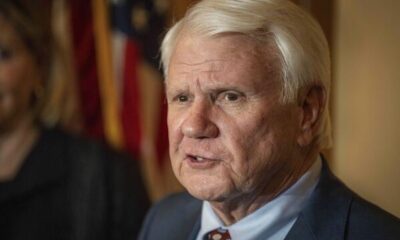
 AP4 months ago
AP4 months agoGeorgia Republican leader seeks policy changes after school shooting but Democrats want more
